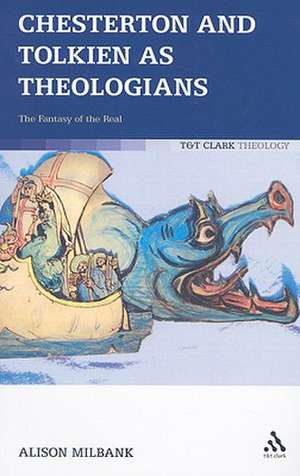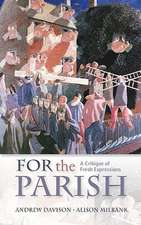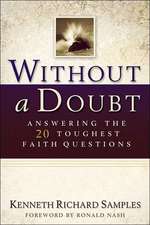Chesterton and Tolkien as Theologians
Autor Rev'd Canon Professor Alison Milbanken Limba Engleză Paperback – 31 dec 2008
Preț: 255.66 lei
Nou
48.92€ • 51.31$ • 40.73£
Carte tipărită la comandă
Livrare economică 01-15 aprilie
Specificații
ISBN-10: 0567390411
Pagini: 202
Dimensiuni: 138 x 216 x 15 mm
Greutate: 0.27 kg
Editura: Bloomsbury Publishing
Colecția T&T Clark
Locul publicării:London, United Kingdom
Caracteristici
Cuprins
Preface
Introduction: Fairies, Fusiliers and Thomists
Part 1: Poetics
Chapter 1: Making Strange: The Fantastic
Chapter 2: The Grotesque
Chapter 3: Paradox and Riddles
Part 2: Praxis
Chapter 4: Fairy Economics: Gift-Exchange
Chapter 5: Fairy Poetics: Make Believe
Conclusion
Bibliography
Index
Recenzii
"The fictional worlds of Chesterton and Tolkien are not only theological but also deeply Augustinian: they show us universes in which creatures exchange gifts with one another and with God. So argues Alison Milbank, with verve and brilliance, in this finely conceived and beautifully written book." Kevin Hart, The University of Virginia
"I would like to think that Milbank's outstanding book, if it achieves nothing else, will make [fans] return to The Lord of the Rings with an enhanced appreciation for the depth, complexity and purpose of the world he created; and maybe, just maybe, entice some of them to the Chestertonian well from which it sprang." - Waterstone's Watford, www.waterstones.com
"Milbank has gifted us with what may well become our finest study of these Catholic artists in their unique relation not only to each other but also to our imagination-starved churches and culture." First Things: The Journal of Religion, Culture and Public Life
Mention -Theology Digest, Summer 2006
'The achievement of this brilliant book is to show the truth of the Chestertonian paradox that is its subtile.' Theology, May 2009
'Milbank provides a fascinating and insightful perspective on the theological application of fantasy and fiction, as seen in the writings of Tolkien and Chesterton. She introduces a metho 92:1d that can be helpful for Christian spirituality as well as the study of theology and literature. As Austin Farrer states, new understandings require new images. In this regard, the writings of Chesterton and Tolkien provide a much-needed renewal as they counter "the loss of sign-making capacity" and the "draining of shared meaning from cultural discourse in the twentieth century".' --Robert B. Slocum, St. Catherine College, Anglican Theological Review
"Neither Chesterton nor Tolkien has received the quality of critical attention their work deserves, but Alison Milbank's remarkable book - as good as anything that has been written so far about either author - does much to remedy that deficiency. So far the field of Chesterton and Tolkien criticism has largely been divided between fierce celebrants and equally fierce detractors, and almost all parties seem to have missed the rich cultural and intellectual contexts from which these authors' works grow. By exploring these contexts - the Catholic encounter with modernity, the conscious and unconscious preservation of ancient folk traditions, the 'fair and perilous' land of Faery - Milbank performs a great service for these writers and their many readers."
"Alison Milbank, of the University of Nottingham, aims to show how Chesterton's theology, and especially his ideas on faërie, influenced Tolkien's writing. This interesting subject produces no leisurely read, but a sophisticated analysis of the thought and works of both authors. Milbank expertly compares the writer's ideas on imagination, the grotesque, paradoxes, and the idea of the gift. This is hardly traditional theology!...it should be considered essential for academic libraries supporting graduate work in English literature." - Daniel Boice, Catholic Library World, September 2008
"The astonishingly high cost of this slim volume is unfortunate, and will limit its availability..." - Daniel Boice, Catholic Library World, September 2008
"Sure to be sought out by Tolkien and Chesterton aficionados."
'a fascinating discussion of the moral obligations implicit in Tolkien's world...a stimulating read.' Raymond Edwards, The Tablet
"Alison Milbank most ably demonstrates in her fascinating and illuminating book [that both Chesterton and Tolkein are theologians] ... Her purpose in making a comparitive study of the two writers, one so celebrated, one so sadly neglected ... is an immensely rewarding exercise, conducted with deftness and deep learning, and productive of more insights than a brief review can acknowledge... The achievement of this brilliant book is to show the truth of the Cherstertonian paradox that is its subtitle." - John Pridmore, Theology, Vol. CXII No. 867, May/June 2009
Descriere
This book takes Chesterton's 'natural theology' through fairytales seriously as a theological project appropriate to an intellectual attempt to return to faith in a secular age. It argues that Tolkien's fiction makes sense also as the work of a Catholic writer steeped in Chestertonian ideas and sharing his literary-theological poetics. While much writing on religious fantasy moves quickly to talk about wonder, Milbank shows that this has to be hard won and that Chesterton is more akin to the modernist writers of the early twentieth-century who felt quite dislocated from the past. His favoured tropes of paradox, defamiliarization and the grotesque have much in common with writers like T. S. Eliot, Ezra Pound and James Joyce and their use of the demotic as well as the 'mythic method'. Using Chesterton's literary rhetoric as a frame, the book sets out to chart a redemptive poetics that first decentres the reader from his habitual perception of the world, then dramatizes his self-alienation through the grotesque, before finding in that very alienation a sort of pharmakon through paradox and an embrace of difference. The next step is to change one's vision of the world beyond the self through magic which, paradoxically, is the means by which one can reconnect with the physical world and remove the fetishism and commodification of the object. Chesterton's theology of gift is the means in which this magic becomes real and people and things enter into reciprocal relations that reconnect them with the divine.











